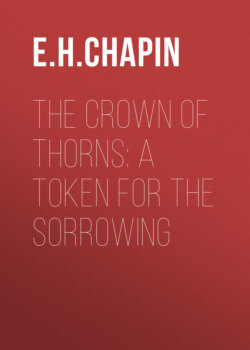The Crown of Thorns: A Token for the Sorrowing

Реклама. ООО «ЛитРес», ИНН: 7719571260.
Оглавление
E. H. Chapin. The Crown of Thorns: A Token for the Sorrowing
The Crown of Thorns: A Token for the Sorrowing
Table of Contents
PREFACE
THE THREE TABERNACLES
THE SHADOW OF DISAPPOINTMENT
LIFE A TALE
THE CHRISTIAN VIEW OF SORROW
CHRISTIAN CONSOLATION IN LONELINESS
RESIGNATION
THE MISSION OF LITTLE CHILDREN
OUR RELATIONS TO THE DEPARTED
THE VOICES OF THE DEAD
MYSTERY AND FAITH
Отрывок из книги
E. H. Chapin
Published by Good Press, 2019
.....
But, I observe, in the second place, that there are those who may discard the notion of retaining any particular condition of life and yet they would preserve unbroken some of its relations. They may not keep the freshness of youth, or prevent the intrusion of trouble, or shut out the claims of responsibility, or the demands for effort;—they may not achieve anything of this kind; and they do not wish to achieve it; but they would build a tabernacle to LOVE, and keep the objects of dear affection safe within its enclosure. "Joy, sorrow, poverty, riches, youth, decay, let these come as they must," say they, "in the flow of Providence; but let the heart's sanctuaries remain unbroken, and let us in all this chance find the presence and the ministration of those we love." And, common as the sight is, we must always contemplate with a fresh sadness this sundering of family bonds; this cancelling(sic) of the dear realities of home; this stealing in of the inevitable gloom; this vacating of the chair, the table, and the bed; this vanishing of the familiar face into darkness; this passage from communion to memory; this diminishing of love's orb into narrower phases—into a crescent—into a shadow. Surely, however broad the view we take of the universe, a real woe, a veritable experience of suffering, amidst this boundless benificence, reaching as deep as the heart's core, is this old and common sorrow;—the sorrow of woman for her babes, and of man for his helpmate, and of age for its prop, and of the son for the mother that bore him, and of the heart for the hearts that once beat in sympathy, and of the eyes that hide vacancies with tears. When these old stakes are wrenched from their sockets, and these intimate cords are snapped, one begins to feel his own tent shake and flap in the wind that comes from eternity, and to realize that there is no abiding tabernacle here.
But ought we really to wish that these relations might remain unbroken, and to murmur because it is not so? We shall be able to answer this question in the negative, I think—however hard it may be to do so—when we consider, in the first place, that this breaking up and separation are inevitable. For we may be assured that whatever in the system of things is inevitable is beneficent. The dissolution of these bonds comes by the same law as that which ordains them; and we may be sure that the one—though it plays out of sight, and is swallowed up in mystery—is as wise and tender in its purpose as the other. It is very consoling to recognize the Hand that gave in the Hand that takes a friend, and to know that he is borne away in the bosom of Infinite Gentleness, as he was brought here. It is the privilege of angels, and of a faith that brings us near the angels, to always behold the face of our Father in Heaven; and so we shall not desire the abrogation of this law of dissolution and separation. We shall strengthen ourselves to contemplate the fact that the countenances we love must change, and the ties that are closest to our hearts will break; and we shall feel that it ought to be, because it must be—because it is an inevitability in that grand and bounteous scheme in which stars rise and set, and life and death play into each other.
.....